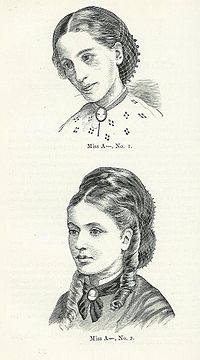
Photo from wikipedia
Objective Anorexia nervosa (AN) is associated with clinical characteristics including eating disorder symptomatology, negative mood states, perfectionism and cognitive inflexibility. Whether these characteristics differ across illness stages, and are also… Click to show full abstract
Objective Anorexia nervosa (AN) is associated with clinical characteristics including eating disorder symptomatology, negative mood states, perfectionism and cognitive inflexibility. Whether these characteristics differ across illness stages, and are also present in first-degree relatives, demonstrating heritability, is unclear. The aim of this research was to compare current AN (c-AN), weight-restored AN (wr-AN), sisters of individuals with AN (AN-sis) and healthy controls (HC) on these measures. Method Eighty participants (n = 20/group) completed the study. Results Eating disorder symptomatology was similar among c-AN and wr-AN groups, whereas the AN-sis did not differ from either wr-AN or HC. Anxiety was significantly higher in c-AN, wr-AN and AN-sis groups, relative to HC. Increased perfectionism was identified in the c-AN and wr-AN groups compared to AN-sis and HC on the ‘concern over mistakes’, ‘personal standards’ and ‘doubt and actions’ subscales of the Multidimensional Perfectionism Scale. Group differences were not apparent on cognitive flexibility. Conclusions These findings suggest that anxiety may be a risk factor or linked to genetic susceptibility for AN, as well as specific aspects of perfectionism that relate to self-imposed standards.
Journal Title: Australasian Psychiatry
Year Published: 2022
Link to full text (if available)
Share on Social Media: Sign Up to like & get
recommendations!